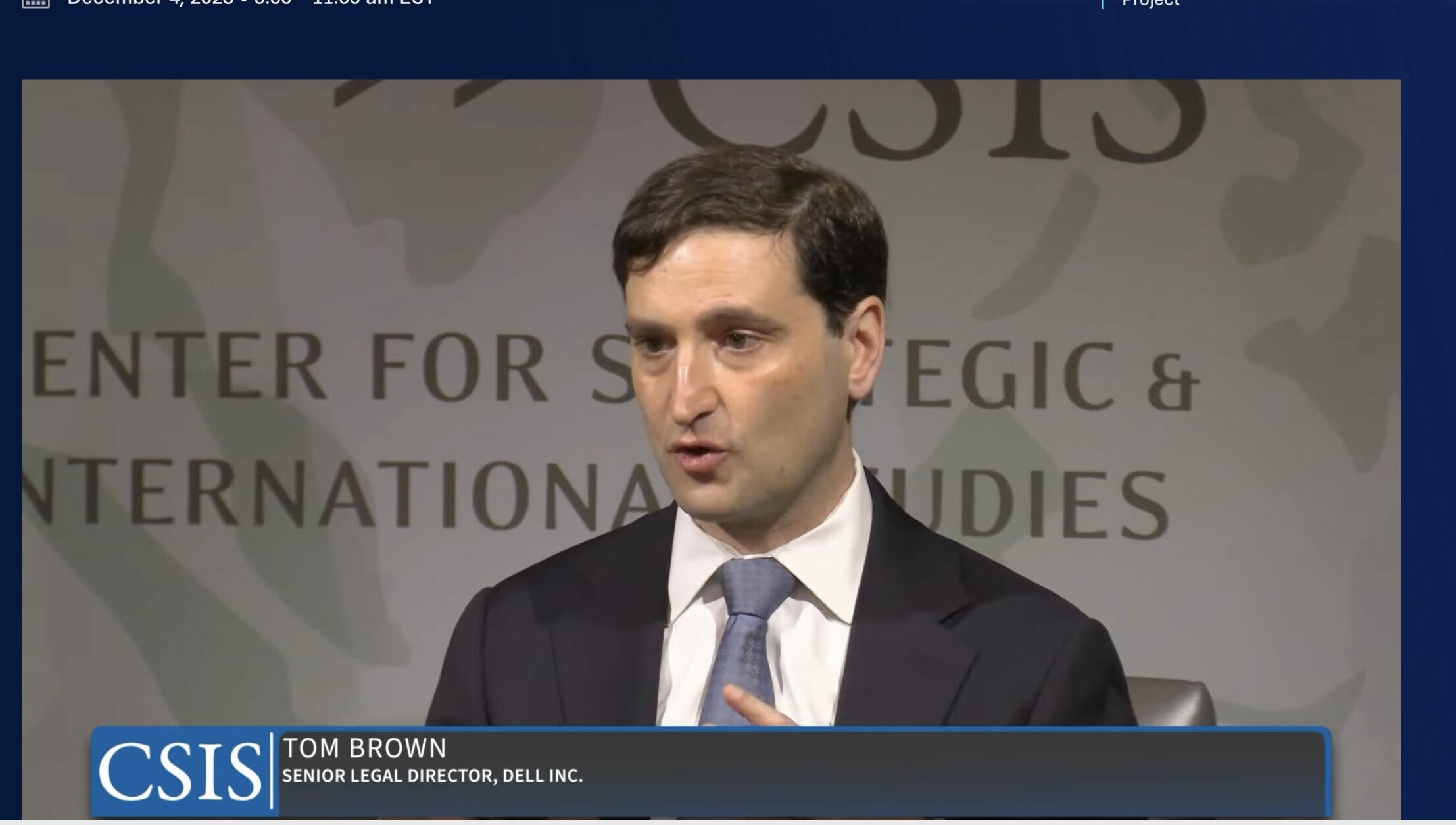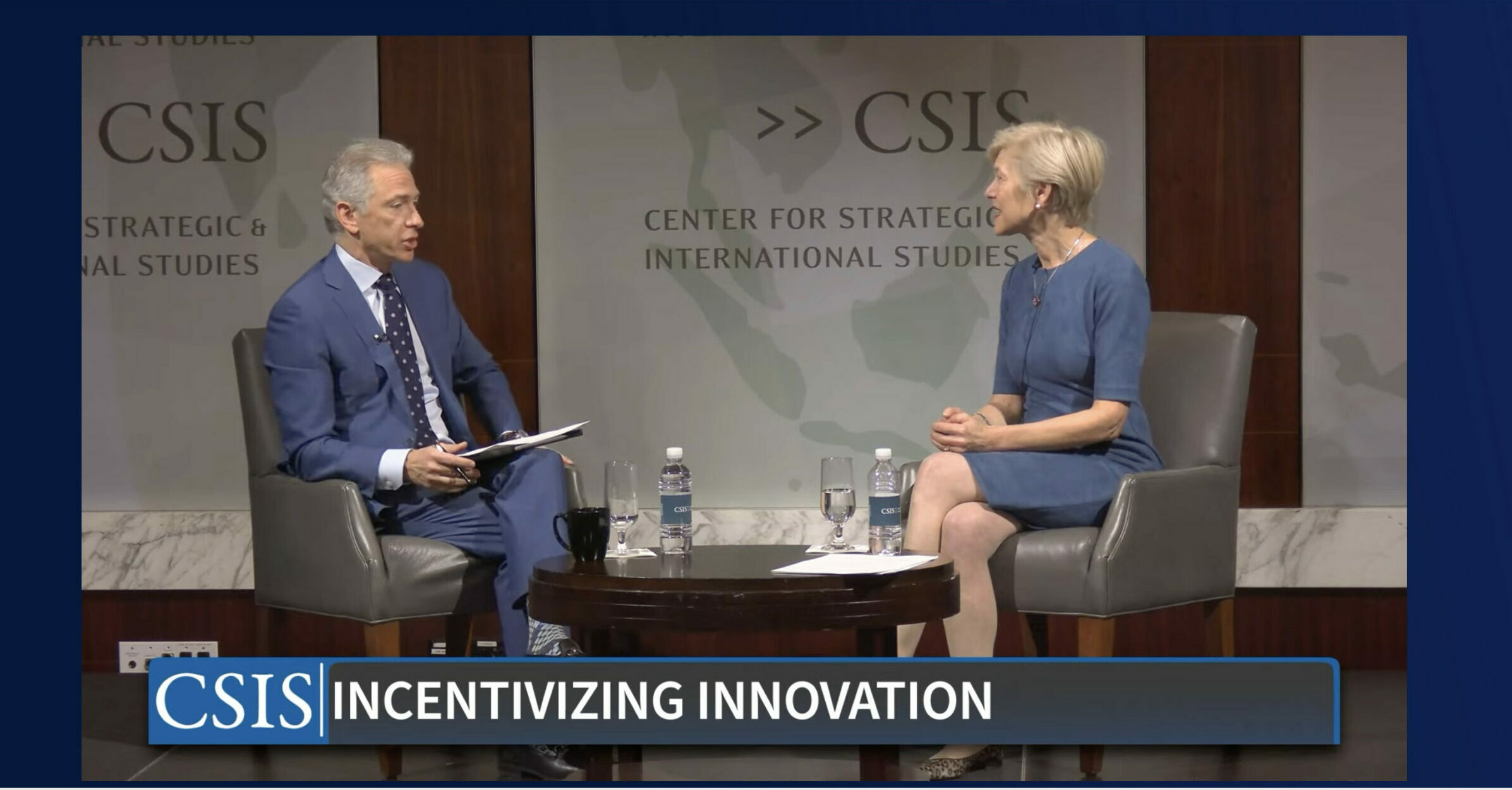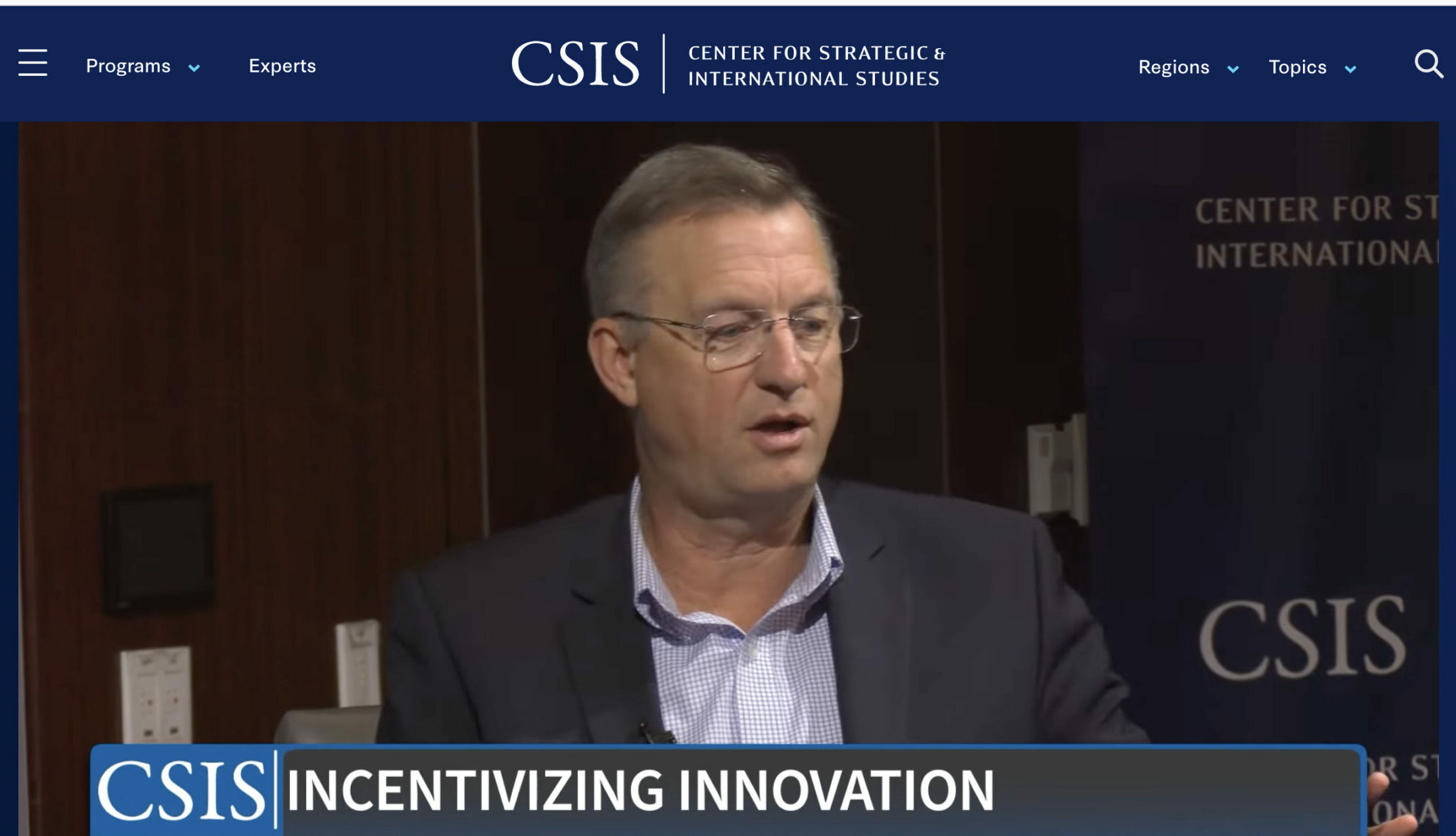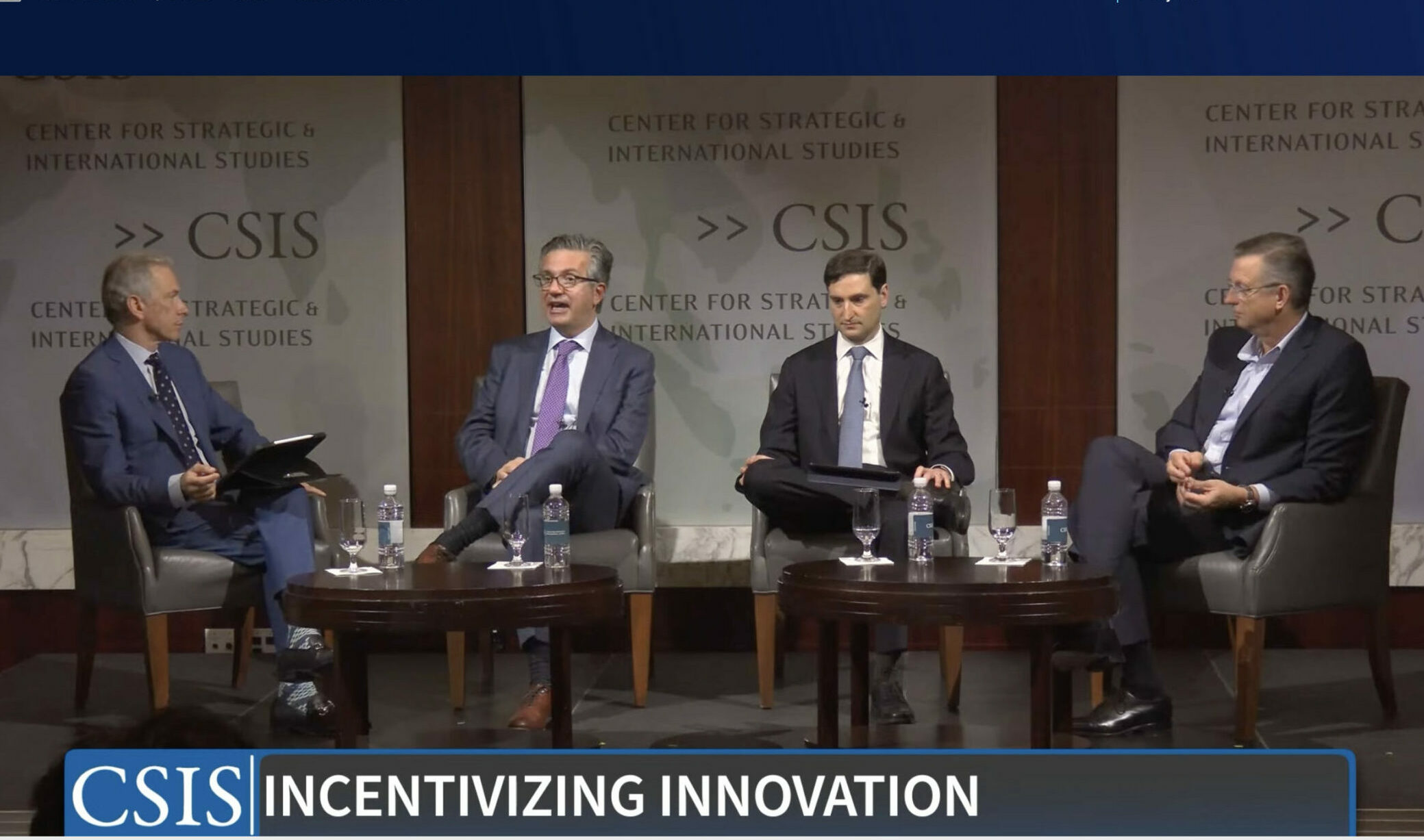CSIS Panel Highlights Divide on PREVAIL Act Provisions
“If you get your patent and spend 15 years defending it, then you really don’t have the protection you need in order to reap the rewards of your innovation.” – Rep. Deborah Ross
Andrei Iancu with Rep. Deborah Ross
An event held Monday by the Center for Strategic & International Studies (CSIS), and moderated by former U.S. Patent and Trademark Office (USPTO) Director Andrei Iancu, featured a number of high-profile political and professional figures in the intellectual property space debating approaches to strengthening the U.S. patent system, with an emphasis on national security.
Representative Deborah Ross (D-NC), who serves on the U.S. House of Representatives’ Judiciary Committee’s Subcommittee on Courts, Intellectual Property and the Internet, first joined Iancu to discuss her reasons for supporting the Promoting and Respecting Economically Vital American Innovation Leadership (PREVAIL) Act. Ross introduced the House version of PREVAIL with Representative Ken Buck (R-CO) in July. The bill was first introduced in June by Senators Thom Tillis (R-NC) and Chris Coons (D-DE).
The PREVAIL Act would, among other changes, require standing for challengers at the Patent Trial and Appeal Board (PTAB); limit multiple petitions against the same patent by “prohibiting any entity financially contributing to a PTAB challenge from bringing its own challenge”; institute a “clear and convincing evidence” standard for patent invalidity at the PTAB and require claims be interpreted using the “plain and ordinary meaning” standard used in district courts; and require parties to choose whether to bring their action at the PTAB or in district court, but not both, in an effort to end duplicative proceedings.
The PREVAIL Act, said Ross, is taking the PTAB, which was “a good idea and does good things,” and making changes because small innovators have had challenges. The way the PTAB has been working, Ross added, “with two different venues…two standards of proof, that creates a quagmire for the small inventor.”
“If you get your patent and spend 15 years defending it, then you really don’t have the protection you need in order to reap the rewards of your innovation,” Ross added.
A panel that followed Ross’s discussion included Henry Hadad, Senior Vice President and Deputy General Counsel at Bristol-Myers Squibb; Tom Brown, Senior Legal Director at Dell; and Doug Collins, former House Representative from Georgia and ranking member of the House Judiciary Committee.

On the subject of national security, Brown cited statistics that he said showed, in FY 2022, 56% of issued U.S. patents were granted to foreign companies, Huawei being among the top 10 of those. He elaborated: “So, as we work to protect U.S. interests, we need to be clear that the more we strengthen U.S. patents, the more we strengthen foreign patent owners to the detriment of U.S. innovators and implementers, and ultimately, the U.S. consumers.”
Brown also referred to PTAB proceedings as “a chance for the expert patent office who first issued the patent to fix their own mistakes” and noted that “less than 0.004% in FY23 of all live patents were fully invalidated.” He added:
“The vast majority of times, nobody loses their whole patent in a PTAB proceeding. It’s important that the PTAB be able to perform its public function that the small percentage of claims being contested be subject to a second look by the PTAB. Limiting who can raise those concerns is a sledgehammer to me for a much, much, much narrower problem.”
As far as harmonizing the standards for burden of proof between the PTAB and district courts, Brown said “absolutely not.” District courts and juries feature lay people making judgments on cases and should be deferring to the USPTO, but a panel of expert judges shouldn’t be, he argued.
Rep. Doug Collins (Ret.)
Brown referred to statistics he said found district courts are almost 2.5 times more likely to get cases wrong in terms of reversal by appellate courts. “We don’t want consistency with that,” he said.” We want accuracy and predictability. Inventors absolutely should have a vested interest in what they invented, and this PTAB process at the end of the day determines that more accurately.”
As to the PREVAIL Act’s goal of curbing repetitive proceedings, Hadad said “it’s bad enough for a large company to deal with multiple bites, but it’s absolutely devastating for the smaller entities impacted by the PTAB.” He countered Brown’s statistics on the tiny percentage of small inventors at the PTAB, noting that those numbers don’t count the number of inventors “no longer seeking patents…or not trying to enforce their patents because they believe it’s a road to ruin.”
The PREVAIL Act’s provision on repetitive proceedings would essentially codify the decision in Sotera Wireless, Inc. v. Masimo Corporation, Paper 12, IPR2020-01019 (December 1, 2020) as law, said Hadad, requiring challengers to either choose the PTAB or district court. However, Iancu pointed out, if a petitioner chooses to file at the PTAB and the Board doesn’t institute, they can still go to district court.
While Brown agreed that duplicative proceedings are wasteful, he said the solution is the PTAB. “The solution is clearly that you should be litigating in the place that gets it right,” Brown said. “When there’s litigation in the PTAB that may affect what happens in district court, the district court proceedings should be stayed…. You cannot have district court proceedings that determine infringement proceed in parallel with PTAB proceedings determining validity because they interact with each other.”
Henry Hadad (speaking)
Hadad challenged Brown on his response, noting that, “whether you stay a district court case or allow the petitioner to choose…to me, it seems like you’re just making the decision for the petitioner? I don’t see why you wouldn’t want to allow the petitioner to make that decision.”
But Brown said that most of the cases are in the context of a preexisting district court litigation, and if the patent owner files suit and then the petitioner challenges claims, the case should be stayed, he said. Iancu pointed out that “in many, many cases that already happens. But what you’re suggesting is it should be mandatory and the district court should have no discretion to manage its own docket?”
Brown said the court should still have discretion, “but the notion that you should have a full- fledged trial while you’re having a full-fledged PTAB proceeding, even if the issues are different, doesn’t make sense to me.”
Collins took issue with Brown’s approach, saying it contradicts the understanding of many congress members at the time of passage of the America Invents Act (AIA) that it should be one forum or the other.
“You’re giving preference to the PTAB proceedings as the authoritative voice,” Collins said. “If you stay the district court and then have to come back to see whatever happens at the PTAB, you’re sort of binding the court to a non-Article III body…. From your perspective everything should just go through the PTAB.”
“The reason why there should be one or the other is to make for a faster, more effective, cheaper solution. That solution is the PTAB, as the AIA recognized, so yes, it should be the PTAB,” Brown replied.
Collins said this is the political argument that’s going to play out on Capitol Hill, and that Brown’s argument is “in essence making a quasi-Article III court out of the PTAB. And I think that’s something that will never fly for many [politicians].”
Hadad added that the PTAB has turned into “the primary basis for invalidating patents based on a limited record, limited witnesses, an inability to test the veracity of witnesses on cross examination,” all of which are important parts of the American jurisprudence system. “There’s a fundamental schism based on certain views of certain technologies and sectors,” Hadad said.
On the final category of changes the PREVAIL Act will make, good governance provisions, the panelists were closer to agreement. These changes include creating a Code of Conduct for PTAB judges and codifying the Arthrex decision. However, on the point of requiring that judges who rule on institution shouldn’t participate on the merits decision, Brown said “there’s no other area of law where we say that someone who’s invested substantial time and effort into evaluating the merits of a particular dispute should then go away and not participate in further evaluations. It’s a waste of time to disqualify those who are most knowledgeable…. If you’re concerned about bias [or] accuracy, that’s what the appellate process is for.”
Iancu noted that at the International Trade Commission (ITC) the administrative law judges (ALJs) who make the institution decision are different than the ALJ who actually runs the case.
“One other area,” Brown conceded.
Asked by Iancu what he thinks the chances are of the bill moving forward in Congress, Collins said there are still ideological, if not partisan, differences. Just as the courts may not be the best place for patent cases to play out, the U.S. Senate and House are also not ideal to debate these issues, “not because the individual members don’t want to, but because this is not a five minute elevator speech,” Collins said.
While he said he’s less hopeful the House will move the bill along quickly, he felt it might be “a possibility” if hearings are held by spring, and he urged the attendees and panelists to make their arguments more practical. “I’ve always said this about IP—we’ve got to get it out of the realm of the theoretical.” Collins said.








